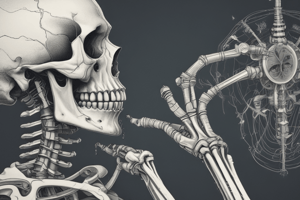Podcast
Questions and Answers
What is the longest bone in the body?
What is the longest bone in the body?
- Fibula
- Tibia
- Patella
- Femur (correct)
How many bones are in each hemipelvis?
How many bones are in each hemipelvis?
- 3 (correct)
- 4
- 5
- 2
What is the name of the joint formed by the articulation of the femur and the acetabulum?
What is the name of the joint formed by the articulation of the femur and the acetabulum?
- Shoulder joint
- Ankle joint
- Hip joint (correct)
- Knee joint
What is the name of the artery that supplies the thigh?
What is the name of the artery that supplies the thigh?
How many tarsal bones are there in the foot?
How many tarsal bones are there in the foot?
What is the name of the muscle that flexes the foot?
What is the name of the muscle that flexes the foot?
What is the name of the vein that drains into the anterior tibial vein?
What is the name of the vein that drains into the anterior tibial vein?
How many phalanges are in each toe, except the big toe?
How many phalanges are in each toe, except the big toe?
Flashcards are hidden until you start studying
Study Notes
Bones of the Lower Limb
- The lower limb consists of the pelvic bones, femur, patella, tibia, fibula, and foot bones.
- The pelvic bones are composed of the sacrum and right and left hemipelvis.
- Each hemipelvis is composed of 3 bones that meet at the acetabulum, which articulates with the femur to form the hip joint.
The Femur
- The femur is the longest bone in the body.
- It articulates with the acetabulum from above to form the hip joint and with the tibia from below to form the knee joint.
- The femur is composed of the head, neck, shaft, trochanters, and condyles.
The Tibia and Fibula
- The tibia lies medially and the fibula lies laterally.
- The tibia articulates with the femur at the knee joint from above.
- Both the tibia and fibula articulate with the tarsal bones (talus) at the ankle joint from below.
- They also articulate with each other.
The Foot Bones
- The foot bones consist of 7 tarsal bones, 5 metatarsals, and 14 phalanges.
- The tarsal bones are: talus, calcaneum, navicular, cuboid, and 3 cuneiform bones.
- Each toe has 3 phalanges, except the big toe, which has 2 phalanges.
Muscles of the Lower Limb
- Anterior muscles (extensors) are found in the front of the lower limb.
- Posterior muscles (flexors) are found in the back of the lower limb.
- Medial muscles (adductors) are found in the middle of the lower limb.
- Anterior muscles (dorsiflexors and extensors of the digits) are found in the front of the foot.
- Posterior muscles (plantiflexors and flexors of the foot) are found in the back of the foot.
- Lateral muscles (evertors) are found on the sides of the foot.
Blood Supply
- The thigh is supplied by the femoral artery.
- At the back of the knee, it becomes the popliteal artery and divides into the anterior tibial artery, posterior tibial artery, and peroneal artery.
- These arteries supply the leg and foot.
Blood Vessels
- The anterior tibial artery becomes the dorsalis pedis artery in the dorsum of the foot.
- The posterior tibial artery divides into the medial and lateral plantar arteries.
- The leg and foot have deep and superficial veins.
- The deep veins are:
- Dorsum of foot: dorsal venous arch that drains into the anterior tibial vein.
- Plantar aspect: medial and lateral plantar veins that drain into the posterior tibial vein and fibular vein.
- At the back of the knee, the veins are:
- Dorsal venous arch that drains into the anterior tibial vein.
- Medial and lateral plantar veins that drain into the posterior tibial vein and fibular vein.
Studying That Suits You
Use AI to generate personalized quizzes and flashcards to suit your learning preferences.




